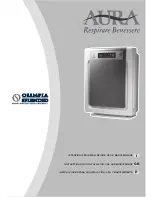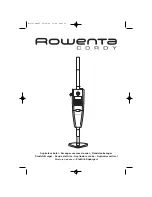
trated in
sketches B and C
may be
used to connect this plug to a 2-pole
receptacle as shown in
sketch B
if a properly grounded outlet is not
available. The temporary adaptor
should be used only until a properly
grounded outlet (
sketch A
) can be
installed by a qualified electrician.
The green colored rigid ear, lug or
the like extending from the adaptor
must be connected to a permanent
ground such as a properly grounded outlet box cover. Whenever the adaptor is used, it must be
held in place by a metal screw.
In CAnAdA, The uSe Of A TeMPORARy AdAPTOR IS nOT PeRMITTed By The CAnAdIAn
eLeCTRICAL COde. Make sure that the appliance is connected to an outlet having the same
configuration as the plug. no adapter should be used with this appliance.
This appliance must be grounded. If it should malfunction or breakdown, grounding provides
a path of least resistance for electric current to reduce the risk of electric shock. This appli-
ance is equipped with a cord having an equipment-grounding conductor and grounding plug.
The plug must be inserted into an appropriate outlet that is properly installed and grounded in
accordance with all local codes and ordinances.
WARNING
– IMPROPER CONNECTION Of THE EQUIP-
MENT-GROUNDING CONDUCTOR CAN RESULT IN A RISk Of ELECTRIC
SHOCk. CHECk WITH A QUALIfIED ELECTRICIAN OR SERVICE PER-
SON If yOU ARE IN DOUBT AS TO WHETHER THE OUTLET IS PROP-
ERLy GROUNDED. DO NOT MODIfy THE PLUG PROVIDED WITH THE
APPLIANCE – If IT WILL NOT fIT THE OUTLET, HAVE A PROPER OUTLET
INSTALLED By A QUALIfIED ELECTRICIAN.
This appliance is for use on a nominal 120-volt circuit, and has a grounded plug that looks
like the plug illustrated in
sketch A
. A temporary adaptor that looks like the adaptor illus-
GROUNDING INSTRUCTIONS
UNPACkING AND SET-UP
WARNING
– ALWAyS DISCONNECT THE PLUG fROM THE
WALL OUTLET BEfORE REMOVING THE TANk COVER.
1. Pull lid latches in an outward motion and remove tank cover. Remove any accessories,
which may have been shipped in the tank.
2. Attach caster system following the instructions and illustrations in this manual.
3. Before replacing tank cover ensure you have the proper filters installed for your cleaning
operation.
A. for dry pick up refer to dry Pick up Operation.
B. for wet pick up refer to Wet Pick up Operation.
C. When using the pump operation feature refer to Pump Operation.
4. Make sure inlet deflector is fully inserted into deflector guide on inside of tank. (See
Installing the Cartridge filter)
5. Replace tank cover and apply pressure with thumbs to each latch until it snaps tightly in
place. Make sure both lid latches are clamped securely.
When using the appliance at a distance where an extension cord becomes necessary, a 3-conductor
grounding cord of adequate size must be used for safety, and to prevent loss of power and overheat-
ing. use the table below to determine A.W.G. wire size required. To determine ampere rating of your
vacuum, refer to nameplate located on rear of motor cover. Before using appliance, inspect power
cord for loose or exposed wires and damaged insulation. Make any needed repairs or replacements
before using your appliance. use only three-wire outdoor extension cords which have three-prong
grounding-type plugs and three-pole receptacles which accept the extension cord’s plug. When
vacuuming liquids, be sure the extension cord connection does not come in contact with the liquid.
NOTE:
STATIC ShOCkS ARe COMMOn In dRy AReAS OR When The ReLATIVe huMIdITy Of The AIR
IS LOW. ThIS IS OnLy TeMPORARy And dOeS nOT AffeCT The uSe Of The APPLIAnCe. TO ReduCe
The fRequenCy Of STATIC ShOCkS In yOuR hOMe, The BeST ReMedy IS TO Add MOISTuRe TO
The AIR WITh A COnSOLe OR InSTALLed huMIdIfIeR.
EXTENSION CORDS
When using an electrical appliance, basic precautions should always be followed, including the
following:
READ ALL INSTRUCTIONS BEfORE USING THIS APPLIANCE.
WARNING
– TO REDUCE THE RISk Of fIRE, ELECTRIC
SHOCk OR INjURy:
1. do not leave appliance when plugged in. unplug from outlet when not in use and before
servicing. Connect to a properly grounded outlet only. See Grounding Instructions.
2. do not expose to rain – store indoors.
3. do not allow to be used as a toy. Close attention is necessary when used by or near children.
4. use only as described in this manual. use only Manufacturer’s recommended attachments.
5. do not use with damaged cord or plug. If appliance is not working as it should, has been
dropped, damaged, left outdoors or dropped into water, contact Shop-Vac Corporation for
assistance.
6. do not: pull or carry by cord, use cord as a handle, close a door on cord or pull cord around
sharp edges or corners. do not run appliance over cord. keep cord away from heated sur-
faces.
7. do not unplug by pulling on cord. To unplug, grasp the plug, not the cord.
8. do not handle plug or appliance with wet hands.
9. do not put any object into openings. do not use with any openings blocked; keep free of dust,
lint, hair and anything that may reduce air flow.
10. keep hair, loose clothing, fingers and all parts of body away from openings and moving parts.
11. do not pick up anything that is burning or smoking, such as cigarettes, matches or hot ashes.
12. do not use without dust bag and/or filters in place.
13. Turn off all controls before unplugging.
14. use extra care when cleaning on stairs.
15. do not use to pick up flammable or combustible liquids such as gasoline or use in areas where
they may be present.
16. do not use your cleaner as a sprayer of flammable liquids such as oil base paints, lacquers,
household cleaners, etc.
17. do not vacuum toxic, carcinogenic, combustible or other hazardous materials such as
asbestos, arsenic, barium, beryllium, lead, pesticides or other health endangering materials.
Specially designed units are available for these purposes.
18. do not pick up soot, cement, plaster or drywall dust without cartridge filter and collection
filter bag in place. These are very fine particles that may pass through the foam and affect the
performance of the motor or be exhausted back into the air. Additional collection filter bags are
available.
19. do not leave the cord lying on the floor once you have finished the cleaning job. It can become
a tripping hazard.
20. use special care when emptying heavily loaded tanks.
21. To avoid spontaneous combustion, empty tank after each use.
22. The operation of a utility vac can result in foreign objects being blown into eyes, which can
result in eye damage. Always wear safety goggles when operating vacuum.
23. STAy ALeRT. Watch what you are doing and use common sense. do not use vacuum cleaner
when you are tired, distracted or under the influence of drugs, alcohol or medication causing
diminished control.
24.
WARNING!
do
NOT
use this vacuum cleaner to vacuum lead paint debris because this may
disperse fine lead particles into the air. This vacuum cleaner is not intended for use under ePA
Regulation 40 CfR Part 745 for lead paint material cleanup.
IMPORTANT SAfETy INSTRUCTIONS
SAVE THESE INSTRUCTIONS
WARNING
– DO NOT LEAVE VACUUM UNATTENDED WHEN IT IS PLUGGED IN AND/OR OPERATING. UNPLUG UNIT WHEN NOT IN USE.
Volts
Total length of cord in feet
120V
Ampere Rating
More Not More
Than Than
0
- 6
6
- 10
10 - 12
12 - 16
25
50
100
150
AWG
18
18
16
14
16
16
16
12
16
14
14
14
12
12
Not recommended
6. Insert long machine hose end with locking-nut into
inlet of tank and tighten. do not over-tighten.
7. Attach ergonomic elbow grip to accessory end
of hose for a more comfortable hand grip while
vacuuming. Twist slightly to tighten the connection
(figure 1)
.
8. Attach the extension wands to the ergonomic elbow grip. Twist slightly to tighten the con-
nection
(figure 1)
.
9. Attach one of the cleaning accessories (depending on your cleaning requirements) to the
extension wands. Twist slightly to tighten the connection
(figure 1)
.
10. Plug the cord into the wall outlet. your cleaner is ready for use.
I = ON, O = Off
NOTE:
MAny MORe uSefuL TOOLS ARe AVAILABLe AT yOuR LOCAL deALeR OR ShOP-VAC
®
WeBSITe.
1
CASTER SySTEM ASSEMBLy
Not all units are equipped with the same caster system. Follow the instructions,
which apply to your specific unit.

































